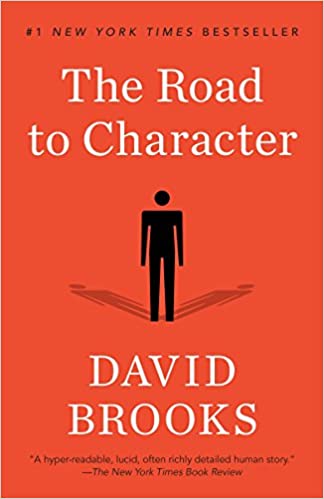Even the hero Achilles suffered from this problem. For some reason, society holds on tight to the belief that accomplishments are the only way we can gain happiness. This belief is incredibly damaging, and here’s why.
Today, we’re going to be talking about why accomplishments alone won’t make you happy.

The Road to Character
by David Brooks
⏱ 17 minutes reading time
🎧 Audio version available
As we mentioned, we can even find this dilemma in ancient mythology. In Homer’s Iliad, Achilles has to decide whether to fight in the Trojan War, where he would certainly die in an epic glory and leave a lasting legacy behind– or to return home and live out a long and happy life with all of his loved ones and eventually die in relative obscurity.
He eventually decided to choose glory instead of happiness, even if it meant his death.
The poem reads:
That two fates bear me on to the day of death.
If I hold out here and I lay siege to Troy,
my journey home is gone, but my glory never dies.
If I voyage back to the fatherland I love,
my pride, my glory dies …
The lesson here is: don’t be like Achilles.
Don’t choose death and glory in place of happiness. That “glory” you’re after will never make you feel successful or satisfied enough. Best case scenario?
You’ll feel a high that will last for a few days, than that urge to be on the move, to find the next bigger, better, and more challenging accomplishment to tackle.
This is called the hedonic treadmill, and an alarming amount of people are stuck on it. It’s why you’ll find most successful people are jealous of more successful people—all in search of feeling special and happy.
The problem is also associated with our society, where achievements are a cornerstone– now more than ever with the world’s obsession with social media and celebrities.
In the 1980s, Robert Goldman, a physician, did a famous study where he found that more than half of aspiring athletes boldly said that they would rather take a drug that would kill them within five years in exchange for winning every competition they entered that day.
Goldman reported that this phenomenon occurred “from the Olympic decathlon to the Mr. Universe.”
How does this apply to you?
We’ll list a few promises you have probably made to yourself and tell us which resonates the most with you.
Have you ever told yourself: once I get that raise/promotion, my career will finally be on track?
Have you ever told yourself: when I make a six-figure salary, that’s when I’ll finally feel financially secure enough to take that vacation, write a book, start a family, or whatever goal you’ve had your heart set out on for years?
Have you ever told yourself that as soon as this one goal is achieved, that’s when you’ll take a break from work and start doing the things you enjoy?
How much time have you wasted pursuing these goals? And when was the breaking point when you realized that there is always going to be another problem, another crisis, and setback, and another goal that will never allow you to move past them?
We live in an extremely goal-oriented society, one that encourages us from a young age that set goals are the only way to make you feel happy?
When we’re older, we start to realize that that work-life is farther away than ever. Even after finally reaching that goal we were so desperately after, all we’re left with is a sense of unfulfillment and more anxiety.
There is a name for that: arrival fallacy, a term introduced by Harvard psychologist Tal Ben-Shahar in his book, Happier.
Arrival fallacy is a false belief that when we finally achieve a particular goal, that’s when we’ll finally become and remain happy. In truth, that moment of achievement, as glorious and satisfying as it is, is fleeting.
Arrival fallacy is a psychological trap, one that successful people, high-achievers, and those who like to have multiple accomplishments under their belts are all too familiar with.
See, when you set your mind on accomplishing something, all sorts of reward centers in your brain are triggered, which induces a cognitive “happy” effect. So, as you go on with your daily business, you feel a sense of accomplishment.
It’s your identity by this point. And you get so used to this state that when you finally achieve that goal, the result is anticlimactic. The aftermath is even worse.
This is where the “good enough” and self-doubt, insecurities, and self-worth, and workaholic problems kick in– due to that unattainable vision of perfection, success, and happiness.
We end up falling into a cycle that reaches out for external, momentary sources of happiness such as accomplishments and material things to complete that void.
We’ll go for larger, more challenging projects, set out to earn more ambitious promotions, and make promises that you’ll even lose more weight than you originally planned to.
But what if we told you that some people found happiness in an alternative way?
Now, you may think who could prefer the learning process over the satisfaction of accomplishing something? Who could not care about getting back positive feedback about their work? Or who could not care how many likes on social media they got for their latest post?
Social media isn’t a traditional medical addiction, but it is an addiction, and so is success. Either way, when we receive praise and positive feedback, the neurotransmitter known as dopamine is stimulated. Dopamine is what all addictive behaviors share.
This is how people get “hooked” on social media. They become obsessed with the dopamine rush from the “likes” they get.
So what’s the solution? Can we ever be truly happy? Yes. Of course. But it won’t be accomplishments alone that will make you happy.
The first step towards a life of fulfillment is admitting the fact that you are not going to find true happiness in your professional on that “hedonic treadmill.”
No, you’ll find it in the simpler things– the things we often take for granted– such as having a conversation with a loved one, laughing with your friends, going on a relaxing walk. Exchange an extra hour of work for one of the previously mentioned activities, and you’ll notice a dramatic difference.
This isn’t admitting defeat, and it’s never too late to quit your workaholic ways and let go of the drive that pushes you to be better than everyone else.
The next step is a little more complicated. Remember all those relationships you may have compromised on your relentless path to success? The friends and family you may have ignored? It’s time to reach out.
Apologize for missing parties, outings, holidays, and events. And don’t stop there. Start showing up. When it comes to relationships, especially slightly damaged ones, actions speak way louder than words and promises.
Then, finally, and this is all on you, and it’s to find the right measure of what you consider to be a success.
Knowingly, or even without realizing it, we measure ourselves by how much money we have if we hold any power, reputation, prestige, and more. That leads to toxic comparison. Find out where the right measure is. And it’s not at your next promotion.
This is why you should value the process over the outcome.
A social scientist by the name of Daniel Pink found that employee performance didn’t improve with external rewards and financial incentives. He discovered that these rewards hindered the employees’ paths, making it harder for them to develop solutions.
Pink quickly realized that motivation is at its peak when people have a genuine desire to perfect their craft. And he found that successful, fulfilled people are more likely to enjoy the learning process.
When their goal ends up being delayed or continued past a set time frame, they’re not that hung up about it. It’s the journey and the happiness they found along the way that they take pleasure in, not the outcome. There is this cliche quote that somehow fits perfectly here, and it says, “It’s the journey, not the destination.”
It’s a cliche because it’s right. You were tricked into thinking that attaining that goal was the only way you’re doing to feel happy when in fact, it was the journey that was leading you to it that brought you joy. It’s during this journey that you learned some lessons, indulged in some simple joys, and had a sense of purpose and contentment.
What Is Snapreads?

With the Snapreads app, you get the key insights from the best nonfiction books in minutes, not hours or days. Our experts transform these books into quick, memorable, easy-to-understand insights you can read when you have the time or listen to them on the go.


